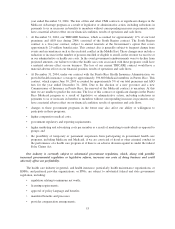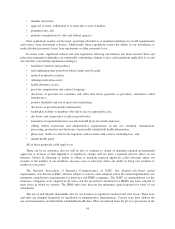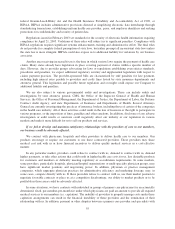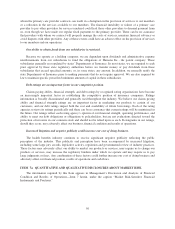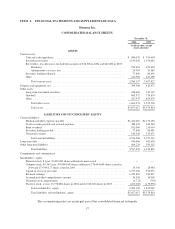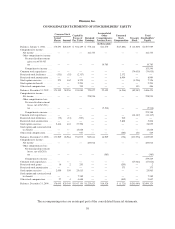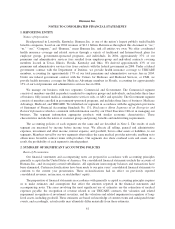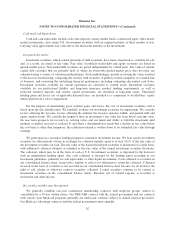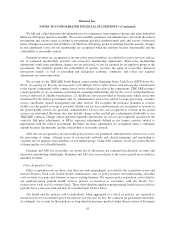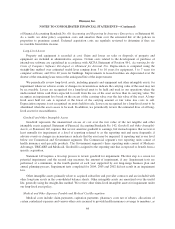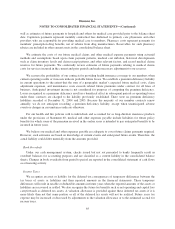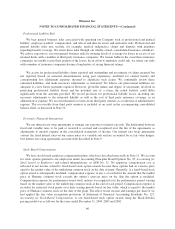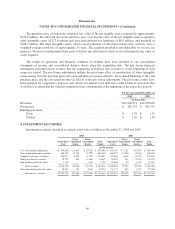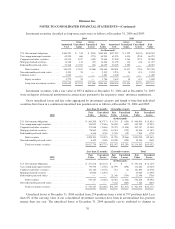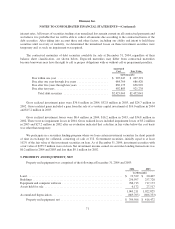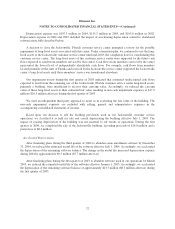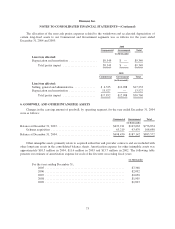Humana 2004 Annual Report Download - page 73
Download and view the complete annual report
Please find page 73 of the 2004 Humana annual report below. You can navigate through the pages in the report by either clicking on the pages listed below, or by using the keyword search tool below to find specific information within the annual report.Humana Inc.
NOTES TO CONSOLIDATED FINANCIAL STATEMENTS—(Continued)
We bill and collect premium and administrative fee remittances from employer groups and some individual
Medicare Advantage members monthly. We receive monthly premiums and administrative fees from the federal
government and various states according to government specified reimbursement rates and various contractual
terms. Changes in revenues from CMS for our Medicare Advantage products resulting from the periodic changes
in risk adjustment scores for our membership are recognized when the amounts become determinable and the
collectibility is reasonably assured.
Premium revenues are recognized as income in the period members are entitled to receive services, and are
net of estimated uncollectible amounts and retroactive membership adjustments. Retroactive membership
adjustments result from enrollment changes not yet processed, or not yet reported by an employer group or the
government. We routinely monitor the collectibility of specific accounts, the aging of receivables, historical
retroactivity trends, as well as prevailing and anticipated economic conditions, and reflect any required
adjustments in current operations.
We account for the TRICARE South Region contract under Emerging Issues Task Force (EITF) Issue No.
00-21, Accounting for Revenue Arrangements with Multiple Deliverables and as such allocate the consideration
to the various components of the contract based on the relative fair value of the components. TRICARE revenues
consist generally of (1), an insurance premium for assuming underwriting risk for the cost of civilian healthcare
services delivered to eligible beneficiaries; (2), healthcare services provided to beneficiaries which are in turn
reimbursed by the federal government; and (3), administrative service fees related to claim processing, customer
service, enrollment, disease management and other services. We recognize the insurance premium as revenue
ratably over the period coverage is provided. Health care services reimbursements are recognized as revenue in
the period health services are provided. Administrative services fees are recognized as revenue in the period
services are performed. Revenues also may include change orders and bid price adjustments attributable to our
TRICARE contracts. Change orders represent equitable adjustments for services not originally specified in the
contracts. Bid price adjustments, or BPAs, represent adjustments defined in our former contracts subject to
negotiations with the federal government. Revenues for these adjustments are recognized when a settlement
amount becomes determinable and the collectibility is reasonably assured.
ASO fees are recognized as income in the period services are performed. Administrative services fees cover
the processing of claims, offering access to our provider networks and clinical programs, and responding to
customer service inquiries from members of self-funded groups. Under ASO contracts, we do not assume the risk
of financing the cost of health benefits.
Premium and ASO fee receivables are shown net of allowances for estimated uncollectible accounts and
retroactive membership adjustments. Premiums and ASO fees received prior to the service period are recorded as
unearned revenues.
Policy Acquisition Costs
Policy acquisition costs are those costs that vary with and primarily are related to the acquisition of new and
renewal business. Such costs include broker commissions, costs of policy issuance and underwriting, and other
costs we incur to acquire new business or renew existing business. We expense policy acquisition costs related to
our employer-group prepaid health services policies as incurred in accordance with the Health Care
Organization Audit and Accounting Guide. These short-duration employer-group prepaid health services policies
typically have a one-year term and may be cancelled upon 30 days notice.
Our health and life policies sold to individuals, when aggregated as a block of policies, are expected to
remain in force for an extended period beyond one year because, by law, the contracts are guaranteed renewable.
Accordingly, we account for these policies as long-duration insurance products under the provisions of Statement
63


